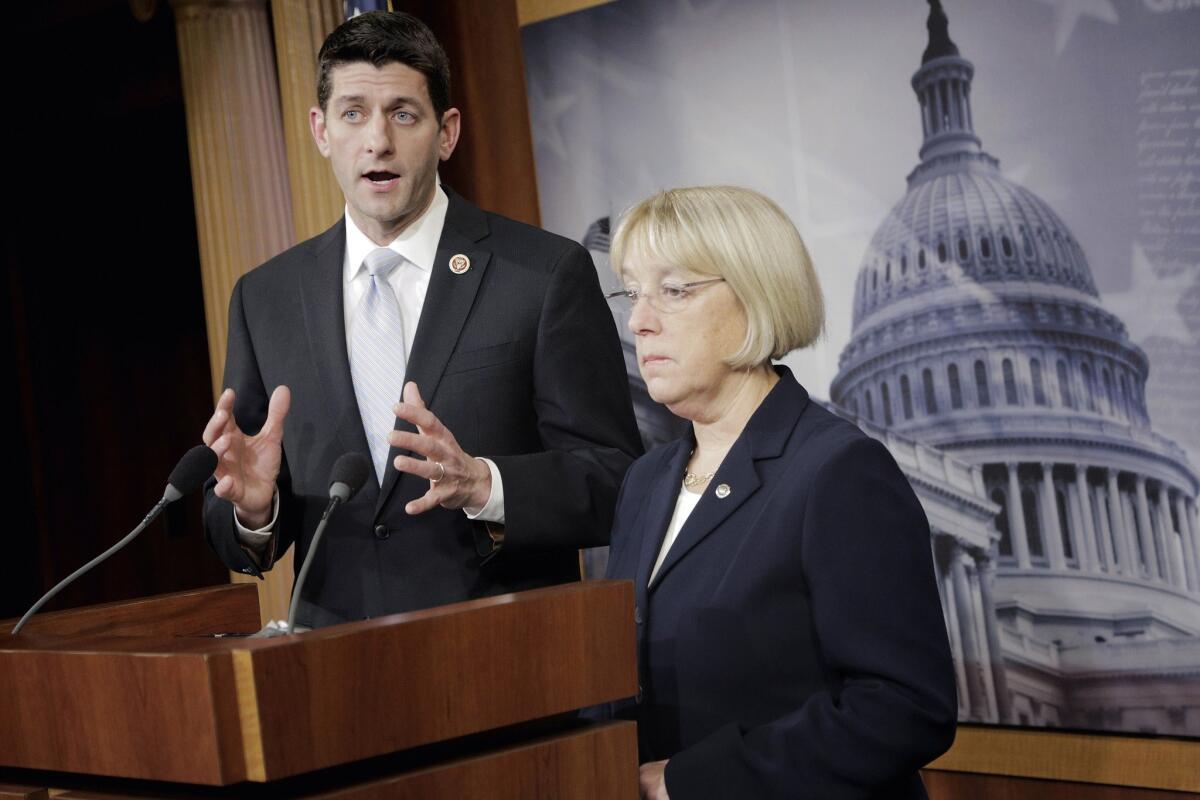A budget deal with pain for Republicans and Democrats

House Budget Committee Chairman Paul D. Ryan (R-Wis.) and Senate Budget Committee Chairwoman Patty Murray (D-Wash.) hold a news conference to announce a bipartisan budget deal Tuesday in Washington.
- Share via
The budget agreement struck by House and Senate negotiators Tuesday will invite Republicans to choose whether they’re for fiscal responsibility or small government.
The deal crafted by House Budget Committee Chairman Paul D. Ryan (R-Wis.) and Senate Budget Committee Chairwoman Patty Murray (D-Wash.) would let the federal government spend almost $45 billion more in the current fiscal year than the Budget Control Act of 2011 allows, and almost $19 billion more in the fiscal 2015. That’s because it rolls back the act’s infamous sequester -- annual across-the-board spending cuts -- by $63 billion over two years, with the extra money evenly divided between defense and non-defense programs.
But it more than offsets the increases by reducing projected spending on some federal benefit programs and increasing “non-tax revenue.” Included among the latter are higher pension contributions by federal employees hired after the end of this year and higher premiums for government-backed corporate pensions.
YEAR IN REVIEW: Washington’s 5 biggest ‘fails’ of 2013
A summary of the proposed agreement describes a variety of small-beer cuts and tweaks, including a crackdown on unemployment benefit fraud, less spending on oil-drilling research and smaller cost-of-living adjustments for military personnel who retire before they turn 65. Almost a third of the savings -- $28 billion -- would come from extending the sequester two years further into the future on certain mandatory spending programs, including Medicare and housing vouchers.
The agreement ignores the longer-term fiscal problems caused by rising healthcare costs and the shrinking ratio of workers to retirees. Nevertheless, the bottom line of the proposed agreement is $22 billion in additional deficit reduction over 10 years, meaning it goes further toward solving Washington’s fiscal problems than the Budget Control Act does.
The increased deficit reduction, however, may not mollify conservatives who are determined to reduce spending. For them, backing away from the Budget Control Act’s spending limits is a non-starter, regardless of whether the changes lead the country closer to a balanced budget.
For this faction, government spending, not the deficit, is the reason the economy is struggling. In their view, spending equals taxes, and taxes are a drag on growth. Some conservative activists have been banging that drum in recent days, warning lawmakers not to vote for lifting the sequester caps under any circumstances.
Yet the GOP caucus is divided, with numerous defense-minded lawmakers and more seasoned members arguing that the sequester cuts are too tough. It’s worth remembering that the sequester was supposed to be a means to an end -- a noxious forcing mechanism designed to compel a compromise approach to the government’s fiscal problems -- and not an end in itself.
Democrats, meanwhile, are being presented a bitter pill too. The deal includes no money to extend federal unemployment benefits, which expire at the end of the year. Without an extension, 1.3 million long-term unemployed Americans will have their aid cut off, and an additional 850,000 laid-off workers won’t have any federal help after their state benefits run out in the first quarter of 2014.
One prominent group of deficit hawks, the Campaign to Fix the Debt, blessed the deal even as it bemoaned the inattention to entitlement reform and other issues crucial to the government’s long-term fiscal health.
“This deal demonstrates that Republicans and Democrats in Congress can work together on a proactive basis, rather than relying on elventh-hour deals and governing by crisis,” said Maya MacGuineas, head of the campaign. “To be clear, this deal falls well short of what is needed to deal with the nation’s fiscal challenges.... Still, it is preferable to another round of punts, gimmicks and showdowns.”
ALSO:
Are America’s students falling behind the world?
10 tips for a better life from The Times’ Op-Ed pages in 2013
SoCal politics in 2013: Some rose, some fell -- and L.A. lost its women, almost
Follow Jon Healey on Twitter @jcahealey and Google+
More to Read
A cure for the common opinion
Get thought-provoking perspectives with our weekly newsletter.
You may occasionally receive promotional content from the Los Angeles Times.










